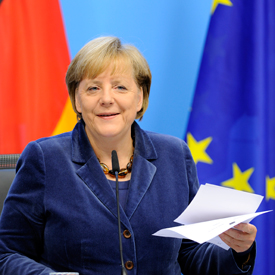Osborne welcomes deal on eurozone debt crisis
Chancellor George Osborne welcomes the eurozone deal but says the “ultimate lesson” of the crisis is that “if you can’t pay your way, you’ll be next in firing line”.
After lengthy discussions, the 17 eurozone leaders agreed on a three-pronged approach to tackle the growing economic crisis, meaning the summit has delivered on the package it promised.
Politicians eventually convinced the holders of Greek debt to forgo 50 per cent of their repayments from Greece, reducing the country’s debt burden by 100bn euros.
Chancellor George Osborne admitted that he had previously concerns about whether an appropriate deal could be made, but welcomed the news, saying that it is “in Britain’s interest” that the euro works more efficiently.
‘Maintain momentum’
The chancellor maintained that the UK would “keep on the pressure to get the detail realised,” and said that there was more to be done: “We must maintain the momentum – this package will not on its own resolve the issues of how to make the Eurozone work more effectively.”
Speaking to the House of Commons on his return from Brussels, Mr Osborne also said that he was “insistent” that the UK’s voice would be heard and its assets protected. The ultimate lesson from the crisis, he said, is: “Unless you can pay your way in the world, and compete in the world, your country will be in the firing line.”
The Chancellor confirmed that British banks would not need additional capital – “an important expression of confidence in this country’s financial system” – and reiterated the government’s stance on the eurozone:”Support for the IMF – yes. But the IMF contributing money to the eurozone bailout fund? No. Britain contributing money to the eurozone bailout fund? No.”
This package will not on its own resolve the issues of how to make the Eurozone work more effectively. George Osborne
As part of the bailout, European banks will be forced to increase their reserves by more than 100bn euro, boosting their liquidity to protect them from further losses.
The final part of the plan involves increasing the eurozone’s main bailout fund – the European Financial Stability Facility – to 1trn euros (£880bn; $1.4trn).
Investors in Asia reacted well to the news and the value of the euro rose, hit a seven-week high.
Read more from Economics Editor Faisal Islam: Brussels 5am: half-a-Bazooka unleashed

The agreement was reached in the early hours of Thursday morning, after more than eight hours of negotiations involving bankers, heads of state, central bankers and the International Monetary Fund.
‘Exceptional measures for exceptional times’
The details have not yet been finalised, but the aim is to complete the package by the end of the year so that Greece has its second financial aid programme in place before the new year.
“The summit allowed us to adopt the components of a global response, of an ambitious response, of a credible response to the crisis that is sweeping across the euro zone,” said French President Nicolas Sarkozy.
European Commission president Jose Manuel Barroso said the summit deal restored confidence in the banking sector and made it clear that “banks should be subject to constraints regarding the distribution of dividends and bonus payments”.
“Increased responsibility and a fair contribution of the financial sector is central to our approach,” he said. “These are exceptional measures for exceptional times.”
-
Latest news
-
Taylor Swift’s new break-up album breaks records3m

-
NHS trust fined £200K for failings that led to death of two mental health patients3m

-
Sunak vows to end UK ‘sick note culture’ with benefit reform3m

-
‘Loose talk about using nuclear weapons is irresponsible and unacceptable’, says head of UN’s nuclear watchdog3m

-
‘There wasn’t an Israeli attack on Iran,’ says former adviser to Iran’s nuclear negotiations team7m

-




